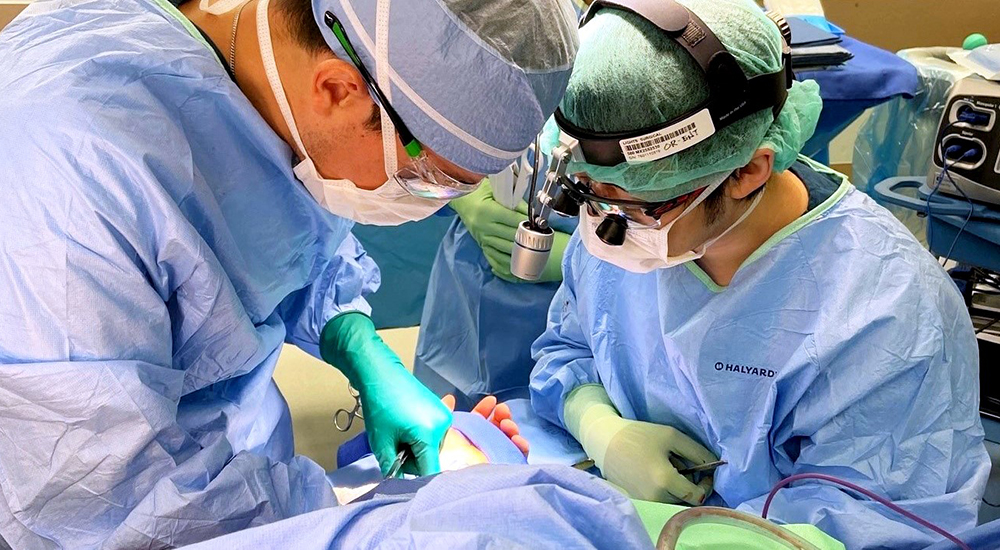In March 2021, Marine Veteran Mark Newton was diagnosed with cancer in the back of his throat and was referred to the Houston VA Head and Neck multidisciplinary team.
“I had a swollen lymph node,” said Newton, who served from 1985 to 1989. “I had it checked out with a CT scan and then they did a biopsy. I had throat cancer.”
The Houston resident underwent radiation and chemotherapy for two months which successfully treated his cancer. But this type of treatment is not for the faint of heart.
“Chemotherapy and radiation for head and neck cancer remains a difficult treatment,” said Dr. Vlad Sandulache, chief of the ENT section of the Operative Care Line. “The radiation is five days a week for six to seven weeks. It can create an intense burn on the skin and neck but also on the inside of your throat. But it is very effective in treating and curing head and neck cancer.”
Cancer returned in six months
Newton was cancer free for about six months. Unfortunately, it returned, this time in his lower jaw. “I went to dental because they pulled out all of my back molars,” he said. “There was one part that wasn’t healing very well. They took a piece of bone out and ran a test on it.”
Since repeating radiation in the head and neck region so soon is risky, surgery was the only remaining option for Newton.
After removal of the cancer, Dr. David Hernandez, reconstructive surgeon, performed a microvascular (free flap) reconstructive surgery which consisted of replacing the right side of Newton’s jaw with healthy fibular bone, muscle, and skin from his leg.
“If you take out bone, you have to replace it with bone,” said Dr. Sandulache. “Once the cancer is removed, we use computer modeling to fashion an identical match from fibular bone and connect it to the blood supply in the neck which is able to restore both form and function.”
About five months following the surgery, Newton is grateful to the surgery team. “I’ve healed really well. I wish it never would have happened. As far as being cancer free in my jaw, yeah, I’m really satisfied. I can get through all the other stuff.”
Building a free flap reconstruction program
The Houston VA Head and Neck team receives referrals from VA facilities across the country, which includes about 150 new patients per year with cancer of the oral cavity, oropharynx, larynx, skin and thyroid. Of those, many will require surgery, and for advanced cancers, that includes extensive and often life-altering surgery.
At Houston VA, Hernandez led the effort to develop a free flap surgery program, focused on patients with advanced stage head and neck cancer that can match the state of the science at leading academic centers in the U.S.”
Since 2017, the Head and Neck team—which includes Hernandez and his partner at Baylor College of Medicine, Dr. Andrew Huang—has performed more than 160 procedures with a complication rate of less than 1%.
“Reconstructive surgery with a low complication rate and excellent outcomes is difficult to achieve even at large academic institutions throughout the U.S.,” said Sandulache. “To be able to achieve both at the volume Dr. Hernandez is doing is incredibly rare.”
A program for thousands of future patients
The surgery is also significant because some patients may be able to receive radiation a second time in case the cancer returns, since healthy tissue has now replaced the previously radiated tissue.
“The highly successful reconstructive program provides us with the opportunity to initiate radiation in a timely fashion and to tackle even complex cases of re-irradiation for recurrent cancer,” said Dr. Albert Chen, chief of the Radiation Oncology section. “That was not possible in previous decades.”
Next year, the team expects to perform about 50 free flap surgeries—saving additional lives.
“We have built this program into one of the busiest head and neck reconstructive practices within VHA,” said Sandulache. “Mr. Newton is one of the success stories but he’s one of many and that’s the key here. It’s about building a program that’s able to do this consistently for thousands of patients over time.”
Topics in this story
More Stories
Pain is like an alarm system; learn to reset the alarm with this 13-minute Mindfulness for Chronic Pain practice.
Veteran Raoul Schander wrote a letter to his surgical team while preparing for coronary artery bypass grafting surgery.
Fewer female Veterans were homeless in 2024 than in 2023, but VA is committed to reducing that number to zero.






What an awesome thing this Team has done for us Veterans!
Great work Dr. Hernandez as well as the VA. such a complicated surgery with high success rate!